formerly eScholarship Editions


|
|
|
|
Your search for
"History and Philosophy of Science"
in subject
and
Public
in rights
found 29 book(s). | Modify Search | Displaying 1 - 20 of 29 book(s) | |
| 1. | 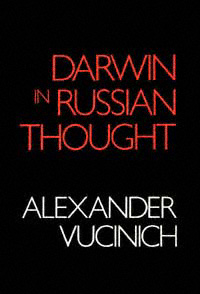 | Title: Darwin in Russian thought Author: Vucinich, Alexander 1914- Published: University of California Press, 1989 Subjects: Science | History and Philosophy of Science Publisher's Description: Darwin in Russian Thought represents the first comprehensive and systematic study of Charles Darwin's influence on Russian thought from the early 1860s to the October Revolution. While concentrating on the role of Darwin's theory in the development of Russian science and philosophy, Vucinich also explores the dominant ideological and sociological interpretations of evolutionary thought, providing a deft analysis of the views held by the leaders of Russian nihilism, populism, anarchism, and marxism.Darwin's thinking profoundly influenced intellectual discourse in Russia: it effected the emergence of "theoretical theology," a modern effort to provide theological responses to the revolutionary changes in the natural sciences, contributed to the evolution of a modern scientific community, and spurred the rapidly growing concern with the epistemological and ethical foundations of science in general. Scholarly battles were waged among the critics of Darwin - Karl von Baer, Nikolai Iakovlevich Danilevskii and Sergei Ivanovich Korzhinskii, and others - and the defenders of the faith.Vucinich is able to delineate the distinctive national characteristics of Russian Darwinism: the strong influence of Lamarckian thought, the delayed recognition of the contributions of genetics, the near-universal rejection of Social Darwinism, the early anticipation of the triumph of "evolutionary synthesis," and the heavy concentration on the social and moral aspects of evolutionary thought. Vividly argued and rich in detail, Darwin in Russian Thought provides a unique glimpse into the Russian psyche. [brief] Similar Items |
| 2. | 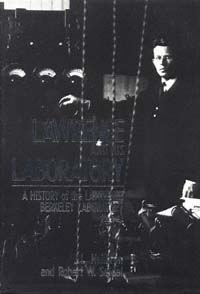 | Title: Lawrence and his laboratory: a history of the Lawrence Berkeley Laboratory Author: Heilbron, J. L Published: University of California Press, 1990 Subjects: Science | History and Philosophy of Science Publisher's Description: The Radiation Laboratory in Berkeley, California, was the birthplace of particle accelerators, radioisotopes, and modern big science. This first volume of its history is a saga of physics and finance in the Great Depression, when a new kind of science was born.Here we learn how Ernest Lawrence used local and national technological, economic, and manpower resources to build the cyclotron, which enabled scientists to produce high-voltage particles without high voltages. The cyclotron brought Lawrence forcibly and permanently to the attention of leaders of international physics in Brussels at the Solvay Congress of 1933. Ever since, the Rad Lab has played a prominent part on the world stage.The book tells of the birth of nuclear chemistry and nuclear medicine in the Laboratory, the discoveries of new isotopes and the transuranic elements, the construction of the ultimate cyclotron, Lawrence's Nobel Prize, and the energy, enthusiasm, and enterprise of Laboratory staff. Two more volumes are planned to carry the story through the Second World War, the establishment of the system of national laboratories, and the loss of Berkeley's dominance of high-energy physics. [brief] Similar Items |
| 3. | 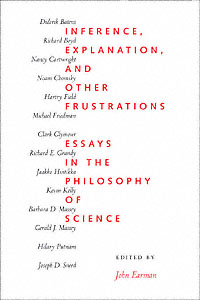 | Title: Inference, explanation, and other frustrations: essays in the philosophy of science Author: Earman, John Published: University of California Press, 1992 Subjects: Philosophy | History and Philosophy of Science Publisher's Description: These provocative essays by leading philosophers of science exemplify and illuminate the contemporary uncertainty and excitement in this changing field. The papers are rich in new perspectives, and their far-reaching criticisms challenge arguments long prevalent in classic philosophical problems of induction, empiricism, and realism. By turns empirical or analytic, historical or programmatic, confessional or argumentative, the authors' arguments both describe and demonstrate the fact that philosophy of science is in a ferment more intense than at any time since the heyday of logical positivism seventy years ago. [brief] Similar Items |
| 4. |  | Title: The persistence of memory: organism, myth, text Author: Kuberski, Philip Published: University of California Press, 1992 Subjects: Literature | History and Philosophy of Science Publisher's Description: While memory is one of the most fascinating faculties of consciousness, it is also one of the most mysterious. Is it memory - our own marvelous personal computer or data base - that brings us the intense feelings prompted by a certain object or situation?Drawing on an expansive array of sources, from microbiology to cosmology, Ovid to Proust, Egyptology to the cinema, Philip Kuberski leads us on a brave and beguiling exploration of memory. He enables us to see it as a worldly process in which individuals both remember and are remembered, all in a network of associations that join our bodies, personal and cultural myths, and aesthetic and literary experiences. His essays will provide a tantalizing and thoughtful read for those interested in literature, psychology, biology, anthropology, and philosophy. [brief] Similar Items |
| 5. |  | Title: Descartes's imagination: proportion, images, and the activity of thinking Author: Sepper, Dennis L Published: University of California Press, 1996 Subjects: Philosophy | History and Philosophy of Science Publisher's Description: Renè Descartes is commonly portrayed as a strict rationalist, a philosopher who theorized a radical, unresolvable split between mind and body. In this long-overdue examination of the role of imagination in Descartes's thought, Dennis Sepper reveals a Descartes quite different from the usual dualistic portrayals and offers a critical reconception of the genesis and nature of the philosopher's thought.In a vigorous analysis of the less-known early works, Sepper finds that initially Descartes assigned the imagination a central role in the mind's activity. Although Descartes eventually lost confidence in the philosophy of imagination, an early understanding of its central role in cognition came to shape the most fundamental notions of his mature philosophy. Sepper's radical reassessment of Descartes ultimately raises new questions about the development of modern philosophy. [brief] Similar Items |
| 6. | 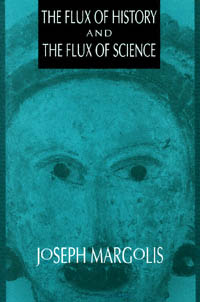 | Title: The flux of history and the flux of science Author: Margolis, Joseph 1924- Published: University of California Press, 1993 Subjects: Philosophy | History and Philosophy of Science Publisher's Description: Does thinking have a history? If there are no necessarily changeless structures to be found in things and in our inquiry into them, then what knowledge of the world and ourselves is possible? In this boldly original and elegantly written study, Joseph Margolis argues for a radically historicized view of history that treats it as both a real process and a narrative account, each a product of continual change. Developing his argument through discussions of such influential philosophers of history and the natural sciences as Vico, Danto, Collingwood, Habermas, Hempel, Popper, Putnam, and Gadamer, he provides a coherent theory of flux and invariance that resolves several deep puzzles regarding human nature and understanding.While maintaining a thorough command of Anglo-American philosophy, Margolis challenges many of its most cherished assumptions and demonstrates the sense in which history and interpretation are one and the same. Exploring one of the master themes of this century, his book offers a novel theory of the human condition whose conclusions and concerns seem certain to inform philosophy in the next century as well. [brief] Similar Items |
| 7. | 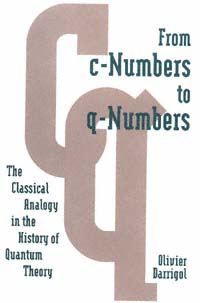 | Title: From c-numbers to q-numbers: the classical analogy in the history of quantum theory Author: Darrigol, Olivier Published: University of California Press, 1993 Subjects: History | History and Philosophy of Science | Physics Publisher's Description: The history of quantum theory is a maze of conceptual problems, through which Olivier Darrigol provides a lucid and learned guide, tracking the role of formal analogies between classical and quantum theory. From Planck's first introduction of the quantum of action to Dirac's formulation of quantum mechanics, Darrigol illuminates not only the history of quantum theory but also the role of analogies in scientific thinking and theory change.Unlike previous works, which have tended to focus on qualitative, global arguments, Darrigol's study follows the lines of mathematical reasoning and symbolizing and so is able to show the motivations of early quantum theorists more precisely - and provocatively - than ever before. Erudite and original, From c-Numbers to q-Numbers sets a new standard as a philosophically perceptive and mathematically precise history of quantum mechanics. For years to come it will influence historical and philosophical discussions of twentieth-century physics. [brief] Similar Items |
| 8. |  | Title: Yorick's world: science and the knowing subject Author: Caws, Peter Published: University of California Press, 1993 Subjects: Philosophy | History and Philosophy of Science Publisher's Description: Peter Caws provides a fresh and often iconoclastic treatment of some of the most vexing problems in the philosophy of science: explanation, induction, causality, evolution, discovery, artificial intelligence, and the social implications of technological rationality.Caws's work has been shaped equally by the insights of Continental philosophy and a concern with scientific practice. In these twenty-eight essays spanning more than a quarter of a century, he ranges from discussions of the work of French philosopher Gaston Bachelard, to relations between science and surrealism, to the concept of intentionality, to the limits of quantitative description. A lively mix of history, theory, speculation, and analysis, Yorick's World presents a vision of science that includes human history and social life. It will interest professional philosophers and scientists, and at the same time its directness will make it readily accessible to nontechnical readers. [brief] Similar Items |
| 9. |  | Title: Race hygiene and national efficiency: the eugenics of Wilhelm Schallmayer Author: Weiss, Sheila Faith Published: University of California Press, 1987 Subjects: Science | History and Philosophy of Science Similar Items |
| 10. | 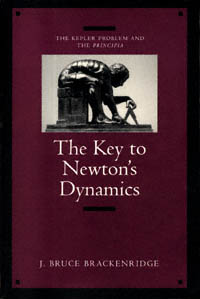 | Title: The key to Newton's dynamics: the Kepler problem and the Principia: containing an English translation of sections 1, 2, and 3 of book one from the first (1687) edition of Newton's Mathematical principles of natural philosophy Author: Brackenridge, J. Bruce 1927- Published: University of California Press, 1996 Subjects: Science | Physics | History and Philosophy of Science Publisher's Description: While much has been written on the ramifications of Newton's dynamics, until now the details of Newton's solution were available only to the physics expert. The Key to Newton's Dynamics clearly explains the surprisingly simple analytical structure that underlies the determination of the force necessary to maintain ideal planetary motion. J. Bruce Brackenridge sets the problem in historical and conceptual perspective, showing the physicist's debt to the works of both Descartes and Galileo. He tracks Newton's work on the Kepler problem from its early stages at Cambridge before 1669, through the revival of his interest ten years later, to its fruition in the first three sections of the first edition of the Principia . [brief] Similar Items |
| 11. |  | Title: A science of impurity: water analysis in nineteenth century Britain Author: Hamlin, Christopher 1951- Published: University of California Press, 1990 Subjects: History | European History | History and Philosophy of Science Similar Items |
| 12. |  | Title: The Quantifying spirit in the 18th century Author: Frängsmyr, Tore 1938- Published: University of California Press, 1990 Subjects: Science | History and Philosophy of Science | Intellectual History Similar Items |
| 13. | 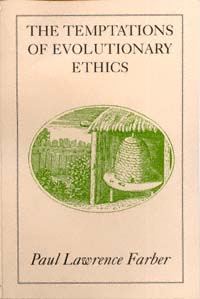 | Title: The temptations of evolutionary ethics Author: Farber, Paul Lawrence 1944- Published: University of California Press, 1994 Subjects: Philosophy | History | Ethics | History and Philosophy of Science Publisher's Description: Evolutionary theory tells us about our biological past; can it also guide us to a moral future? Paul Farber's compelling book describes a century-old philosophical hope held by many biologists, anthropologists, psychologists, and social thinkers: that universal ethical and social imperatives are built into human nature and can be discovered through knowledge of evolutionary theory.Farber describes three upsurges of enthusiasm for evolutionary ethics. The first came in the early years of mid-nineteenth century evolutionary theories; the second in the 1920s and '30s, in the years after the cultural catastrophe of World War I; and the third arrived with the recent grand claims of sociobiology to offer a sound biological basis for a theory of human culture.Unlike many who have written on evolutionary ethics, Farber considers the responses made by philosophers over the years. He maintains that their devastating criticisms have been forgotten - thus the history of evolutionary ethics is essentially one of oft-repeated philosophical mistakes.Historians, scientists, social scientists, and anyone concerned about the elusive basis of selflessness, altruism, and morality will welcome Farber's enlightening book. [brief] Similar Items |
| 14. | 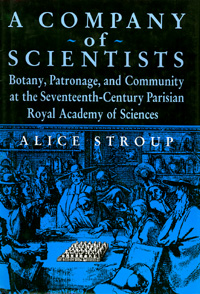 | Title: A company of scientists: botany, patronage, and community at the Seventeenth-century Parisian Royal Academy of Sciences Author: Stroup, Alice Published: University of California Press, 1990 Subjects: History | History and Philosophy of Science | European History Publisher's Description: Who pays for science, and who profits? Historians of science and of France will discover that those were burning questions no less in the seventeenth century than they are today. Alice Stroup takes a new look at one of the earliest and most influential scientific societies, the Académie Royale des Sciences. Blending externalist and internalist approaches, Stroup portrays the Academy in its political and intellectual contexts and also takes us behind the scenes, into the laboratory and into the meetings of a lively, contentious group of investigators.Founded in 1666 under Louis XIV, the Academy had a dual mission: to advance science and to glorify its patron. Creature of the ancien régime as well as of the scientific revolution, it depended for its professional prestige on the goodwill of monarch and ministers. One of the Academy's most ambitious projects was its illustrated encyclopedia of plants. While this work proceeded along old-fashioned descriptive lines, academicians were simultaneously adopting analogical reasoning to investigate the new anatomy and physiology of plants. Efforts to fund and forward competing lines of research were as strenuous then as now. We learn how academicians won or lost favor, and what happened when their research went wrong. Patrons and members shared in a new and different kind of enterprise that may not have resembled the Big Science of today but was nevertheless a genuine "company of scientists." [brief] Similar Items |
| 15. | 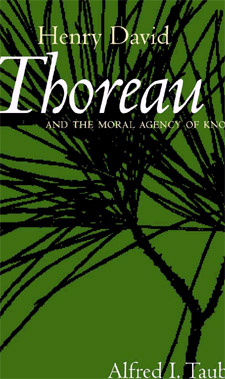 | Title: Henry David Thoreau and the moral agency of knowing Author: Tauber, Alfred I Published: University of California Press, 2001 Subjects: Philosophy | Literature | History and Philosophy of Science | Ethics Publisher's Description: In his graceful philosophical account, Alfred I. Tauber shows why Thoreau still seems so relevant today - more relevant in many respects than he seemed to his contemporaries. Although Thoreau has been skillfully and thoroughly examined as a writer, naturalist, mystic, historian, social thinker, Transcendentalist, and lifelong student, we may find in Tauber's portrait of Thoreau the moralist a characterization that binds all these aspects of his career together. Thoreau was caught at a critical turn in the history of science, between the ebb of Romanticism and the rising tide of positivism. He responded to the challenges posed by the new ideal of objectivity not by rejecting the scientific worldview, but by humanizing it for himself. Tauber portrays Thoreau as a man whose moral vision guided his life's work. Each of Thoreau's projects reflected a self-proclaimed "metaphysical ethics," an articulated program of self-discovery and self-knowing. By writing, by combining precision with poetry in his naturalist pursuits and simplicity with mystical fervor in his daily activity, Thoreau sought to live a life of virtue - one he would characterize as marked by deliberate choice. This unique vision of human agency and responsibility will still seem fresh and contemporary to readers at the start of the twenty-first century. [brief] Similar Items |
| 16. |  | Title: Averting catastrophe: strategies for regulating risky technologies Author: Morone, Joseph G Published: University of California Press, 1988 Subjects: Environmental Studies | History and Philosophy of Science | Politics Publisher's Description: Chernobyl, Bhopal, and Love Canal are symbols of the potentially catastrophic risks that go hand in hand with much modern technology. This volume is a non-partisan study of the imperfect but steadily developing system for containing the risks of such technologies as chemicals, nuclear power, and gen . . . [more] Similar Items |
| 17. | 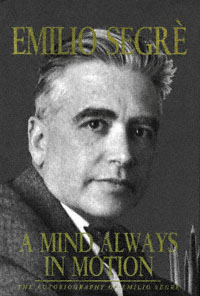 | Title: A mind always in motion: the autobiography of Emilio Segrè Author: Segrè, Emilio Published: University of California Press, 1993 Subjects: Science | History and Philosophy of Science | Physics | Autobiography Publisher's Description: The renowned physicist Emilio Segrè (1905-1989) left his memoirs to be published posthumously because, he said, "I tell the truth the way it was and not the way many of my colleagues wish it had been." This compelling autobiography offers a personal account of his fascinating life as well as candid portraits of some of this century's most important scientists, such as Enrico Fermi, E. O. Lawrence, and Robert Oppenheimer.Born in Italy to a well-to-do Jewish family, Segrè showed early signs of scientific genius - at age seven he began a notebook of physics experiments. He became Fermi's first graduate student in 1928 and contributed to the discovery of slow neutrons, and later was appointed director of the physics laboratory at the University of Palermo. While visiting the Radiation Laboratory at Berkeley in 1938, he learned that he had been dismissed from his Palermo post by Mussolini's Fascist regime. Lawrence then hired him to work on the cyclotron at Berkeley with Luis Alvarez, Edwin McMillan, and Glenn Seaborg. Segrè was one of the first to join Oppenheimer at Los Alamos, where he became a group leader on the Manhattan Project. His account of that mysterious enclave of scientists, all working feverishly to develop the atomic bomb before the Nazis did, includes his description of the first explosion at Alamogordo.Segrè writes movingly of the personal devastation wrought by the Nazis, his struggles with fellow scientists, and his love of nature. His book offers an intimate glimpse into a bygone era as well as a unique perspective on some of the most important scientific developments of this century. [brief] Similar Items |
| 18. |  | Title: The making of a social disease;: tuberculosis in nineteenth-century France Author: Barnes, David S Published: University of California Press, 1995 Subjects: History | History and Philosophy of Science | Medicine | European History Publisher's Description: In this first English-language study of popular and scientific responses to tuberculosis in nineteenth-century France, David Barnes provides a much-needed historical perspective on a disease that is making an alarming comeback in the United States and Europe. Barnes argues that French perceptions of the disease - ranging from the early romantic image of a consumptive woman to the later view of a scourge spread by the poor - owed more to the power structures of nineteenth-century society than to medical science. By 1900, the war against tuberculosis had become a war against the dirty habits of the working class.Lucid and original, Barnes's study broadens our understanding of how and why societies assign moral meanings to deadly diseases. [brief] Similar Items |
| 19. | 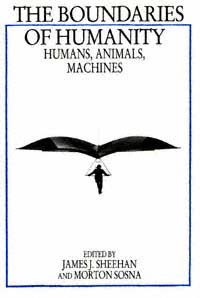 | Title: The Boundaries of humanity: humans, animals, machines Author: Sheehan, James J Published: University of California Press, 1991 Subjects: Philosophy | History and Philosophy of Science | Biology | Technology and Society Publisher's Description: To the age-old debate over what it means to be human, the relatively new fields of sociobiology and artificial intelligence bring new, if not necessarily compatible, insights. What have these two fields in common? Have they affected the way we define humanity? These and other timely questions are addressed with colorful individuality by the authors of The Boundaries of Humanity .Leading researchers in both sociobiology and artificial intelligence combine their reflections with those of philosophers, historians, and social scientists, while the editors explore the historical and contemporary contexts of the debate in their introductions. The implications of their individual arguments, and the often heated controversies generated by biological determinism or by mechanical models of mind, go to the heart of contemporary scientific, philosophical, and humanistic studies. [brief] Similar Items |
| 20. | 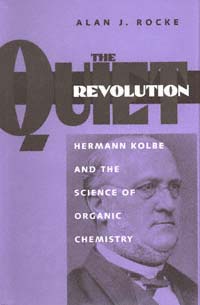 | Title: The quiet revolution: Hermann Kolbe and the science of organic chemistry Author: Rocke, Alan J 1948- Published: University of California Press, 1993 Subjects: Science | History and Philosophy of Science | Physical Sciences | European History Publisher's Description: Organic chemist Hermann Kolbe (1818-1884) is the subject of this vigorously contextualized biography, which combines the approaches of cognitive and social history of science. Kolbe was one of the most outstanding chemists during the remarkable period in which German science, like the wider manifestations of German industrial and political power, rose to a position of world dominance.Rocke portrays Kolbe as a leading actor in the transformation of the institutional and pedagological dimensions of the physical sciences, as well as in the rapid growth of technologically powerful pure sciences. In all these areas there was a sharp inflection point around 1860 when, as Rocke persuasively argues, the primary discipline in the drama was organic chemistry. [brief] Similar Items |